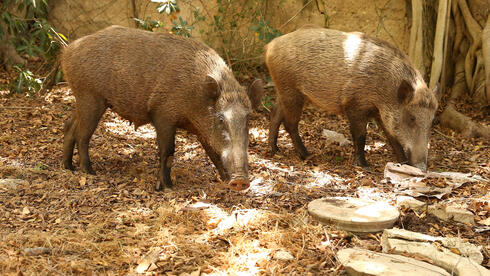Farmers in the southern Dead Sea region say they are facing an escalating threat from wild boars that have been raiding fields, tearing open greenhouses and increasingly entering residential areas.
Growers in the moshavim Ein Tamar and Neot HaKikar say herds have become more aggressive over the past year, destroying crops and causing tens of thousands of shekels in damage. Some farmers report that the animals are crossing from Jordan, though most of the boars come from a long-standing population near the Sdom Salt Flats.
Jordanian wild boars enter Israel
(Video: Tamar Regional Council)


For decades, a small, isolated group of boars lived in the area. They are smaller and faster than the boars common in northern Israel. Residents say the situation has never been as severe as it is now.
Tzvika Dor, a farmer of 32 years, said the animals now appear everywhere. “Some years there were more, some less, but now it is unbearable,” he said. “We see them in yards, on lawns, on the road. They cross the promenade and threaten children. It is terrifying. This is a disaster.”
The boar population has grown steadily since the early 1990s, when widespread illegal hunting by foreign laborers nearly wiped out the animals. Since then, the population has rebounded and expanded into agricultural areas.
Asaf Shamir, deputy CEO for assessment and claims at KANAT, the state-backed agricultural insurance fund, said wildlife damage to crops is common but the current situation is unusual. “This is the first time they are breaking into closed greenhouses and tearing them,” he said. Openings in the structures allow viruses to spread, causing additional damage. Losses already reach tens of thousands of shekels and could rise into the hundreds of thousands, he said.
Farmers and the Tamar Regional Council accuse the Israel Nature and Parks Authority of blocking more assertive action. INPA officials counter that poor sanitation and agricultural waste draw the animals into the area.
“Wild boars have always lived here,” said Dr. Dror Hablena, INPA’s chief scientist. He said earlier generations of farmers in the region were more attentive to conservation and better protected their fields, helping reduce damage. “Reducing the population alone is not a solution,” he said. “Agricultural waste harms wildlife. Fruit and vegetables high in sugar are damaging to them.”
INPA said the boar herd has lived in the southern Dead Sea communities and the Sdom Salt Flats nature reserve for many years. The expansion of farmland and new neighborhoods has reduced the boars’ habitat, while unsanitary waste sites have attracted them to settled areas. The agency said it has issued a culling permit.
The Tamar Regional Council said it sees maintaining agriculture and settlement along Israel’s eastern border as a strategic priority and rejected INPA’s explanation. “The nature authority is not taking meaningful action to address this severe problem in our area,” the council said. “Residents are being told to remain inside the communities and fence all agricultural land, but this is not practical. Fencing everything places a heavy financial burden on farmers. The Nature and Parks Authority must act immediately, before residents are harmed.”

